The Sergeant and the Shooter
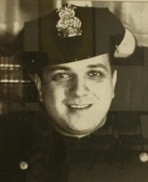
When an infuriated ex-soldier took a Veterans Administration official hostage in Erie, Pennsylvania, Sgt. Leo J. Waldinger and Patrolman Walter R. May rescued the victim and sacrificed their own lives. This is the story of Leo Waldinger—and the man who murdered him in November of 1949.
Leo Jonas Waldinger was born on December 2, 1911, the sixth child born to Joseph and Anna Rinderle Waldinger, both German immigrants. The family lived in Millcreek, a suburb of Erie, Pennsylvania, where Joseph was a farmer. Leo’s mother died suddenly of a heart condition in 1928 when he was only sixteen, and his sister, Sylvia, perished in 1935 of tuberculosis at the age of twenty-eight.
Geraldine Pfadt became Leo’s bride on September 7, 1936, when he was twenty-five years old and she was nineteen. The ceremony took place at Sacred Heart Catholic Church in Erie, and the sanctuary was decorated with gladiolas, palms, and ferns. The reception took place in the bride’s home before the couple left for their honeymoon, an auto trip out west. The wedding announcement said that Leo was an employee at S.M. Flickinger Co.
Several members of Leo’s family worked at Flickinger, including his uncle, father, and brother. His father’s brother, Ferdinand (F.J.), had merged his own successful grocery wholesale business with Buffalo-based S.M. Flickinger and then served as manager of the Erie location on Wallace Street, eventually becoming a vice president and member of the board of directors. The company later became Red & White Foods (now part of the Federated Group), and it also operated the IGA and Super Duper grocery stores.
Leo and Geraldine were active in their Catholic faith. Geraldine was a member of the Catholic Daughters of America. Leo belonged to the Knights of Columbus and helped out with various fundraisers at Sacred Heart Church. He had once intended to become a priest, spending several years at the Pontifical College Josephinum in Columbus, Ohio.
Just four days before Leo and Geraldine’s first child, Leo Jr., was born in February 1939, Leo’s father, Joseph, died of heart disease. In early 1940, the Waldinger’s second child, Kathleen, was born, and in 1943, they had another daughter, Sylvia, most likely named after Leo’s late sister.
In October of 1940, a year before the attack on Pearl Harbor, Leo registered for the draft. From the registrar’s report, we get an idea of his physical stature. He was 6’1” and 225 lbs. with brown hair and blue eyes.
A Vocation in Law Enforcement
Leo Waldinger’s law-enforcement career began in the spring of 1942 when he began police training, and on July 14, 1942, he was hired as a city patrolman at $145 per month. The following year, he was selected in the 41st replacement draft and granted a leave of absence from the Erie Police Department so he could join the United States Marines.
Just after Christmas in 1943, Waldinger left for Marine Corps recruit training at Parris Island, South Carolina. By June of 1944, a total of thirty-three members of the Erie Police Department had gone to war. After serving in the South Pacific, Private First Class Leo Waldinger was honorably discharged and returned to work as a police officer in December of 1945.
Waldinger was a natural leader and in January of 1948, he was promoted to the rank of sergeant in the Erie Police Department. In May of that year, he was named president of the Hass Lodge of the Fraternal Order of Police (FOP).
Cliff Taylor, a long-time columnist for the Erie Daily Times, rode along with Waldinger one day and wrote about the experience for his light-hearted column in December of 1948. As they cruised through the city, a call came over the radio about a fight in a house nearby. Taylor reported that Waldinger stepped on the gas, remarking that on a call like this, they never knew whether the disturbance was a spat between a married couple or a rumble within a group of guys.
Typically writing in the “royal we” style, Taylor recounted the experience in a manner meant to be humorous, but eerie in retrospect. “The sergeant drew up to the curb and hopped out of the car. Instinct told us [Taylor] we were safer with him, and that if we walked directly behind him and somebody started shooting, the bullet would be almost spent by the time it went through him and hit us.”
Taylor wrote that he followed Waldinger, who pushed past a large man at the door and then ran up the stairs. It turned out to be a domestic disturbance and the neighbors had called the police because of all the “screaming and hollering.” Taylor wrote that he tried to look like a scowling detective throughout the incident, but that he was quite rattled by the experience. He ended his article with, “But the point is that we just want the people of Erie to know that here we are on the side of law and order, and willing to get shot if necessary for dear old Erie.”
In April of 1949, Waldinger received word that he had been selected to attend a class at J. Edgar Hoover’s FBI National Academy in Washington, DC. The course would be twelve-weeks long, ten for general instruction and two for specialization. When he graduated, he would be qualified to become a police instructor. He participated in the same firearms programs as the FBI agents. He also learned about crime scene searches, investigations, evidence preparation, and crime photography. In July, Waldinger received his diploma, one of 55 officers from 31 states and one of only six other law-enforcement officers in northwestern Pennsylvania with this designation.
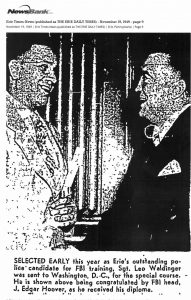
Disturbance at the Veterans Administration Office
On November 18, 1949, at around 2:30 p.m., Leo Waldinger was being driven home from his shift by Sgt. Frank Nowak, when a call came over the radio that there was a disturbance at the G. Daniel Baldwin Building on Tenth and State Streets (now known as the Renaissance Center). Waldinger insisted on stopping even though he was off-duty.
Ed Wellejus wrote in a 1981 Erie Daily Times article that Frank Figaski, an Erie Police Department patrolman at the time, recalled seeing a number of policemen and a crowd at the Baldwin building as he rode in a city bus on the way home from work. He figured someone had accidently pulled the alarm again.
There was no accidental pulling of the alarm that day. In an eighth-floor office, Charles Robert Hartwell, a 28-year-old Army veteran, was holding a gun to the head of the director of the local Veterans Administration office, Arthur L. Criswell. Hartwell had a continuing complaint that the Army made him mentally ill and he was due a disability pension, while the Army maintained that he had been mentally ill before he joined up.
We may never know when Hartwell’s mental illness first began. He was born on February 25, 1921 and attended McKinley Elementary School where he earned a perfect-attendance award in 1930. Hartwell was a Boy Scout in Troop 34 at St. Stephen’s Lutheran Church and received a Tenderfoot badge in 1935. That year he also earned an honor report card at Wilson Junior High. He participated in various academic and extracurricular activities at school. At Academy High, he was a member of the Rod and Gun Club and graduated in 1940.
In February of 1942, Hartwell registered for selective service. On his draft registration card, he stated that he worked at Bucyrus Erie and lived with his parents. The document describes him as 5’9” and 190 lbs. with brown hair, brown eyes, and a ruddy complexion.
The June 3, 1942 Erie Daily Times included Hartwell among twenty-one other men enlisting in the military. He chose the Army Aviation Cadets. In a later interview, Hartwell said he went through multiple tests of different kinds and then was sent to Texas for training. There he underwent more tests and was told he needed his tonsils out before he could progress further. When the Army didn’t go ahead with the operation, Hartwell said he became increasingly frustrated as the Army “shipped him around.” Finally, he said he “blew his top,” and he claimed he received rough treatment and was kept in solitary confinement at a hospital in Georgia. He was also committed to Halloran General Hospital on Staten Island in April of 1943.
After ten months, Hartwell said the Army discharged him and escorted him under military guard to Warren State Hospital, a psychiatric facility. There, he was diagnosed with dementia praecox, now known as schizophrenia. Fed up there, too, he escaped and returned home only to be taken back to the hospital by police.
In 1945, Hartwell worked as a laborer at Erie Concrete and Supply and lived with his mother and brother. In 1948, he was working as a brakeman for the Pennsylvania Railroad and was then living with both parents.
By 1949, Hartwell was laid off and seeking a veterans disability pension. Even after several attempts, the Veterans Administration maintained that he had not served long enough to receive a pension and that his disability was not service connected.. VA Manager Criswell told the press that Hartwell’s records show that he served just four months and five days, which differs with his claim of ten months.
Hartwell’s 1951 application for World War II compensation shows him entering the service on June 9, 1942 in two different places. One of those is crossed out and December 4, 1942 is penciled in. Criswell also stated that Hartwell had been confined to three different army mental institutions before being discharged and sent to Warren State Hospital.
Showdown With the Veterans Administration
On the morning of November 18, 1949, Hartwell said he woke up on pins and needles ruminating about his continuing feud with the VA. He decided to pay the office another visit. Inside his pocket was an illegal Smith & Wesson .38 pistol. Hartwell later said he only intended to brandish the gun and make the VA more agreeable to his point of view. He had carried the gun to the office two times before.
A provisional permit, which did not prohibit concealed carry, had been issued for the gun by the county treasurer’s office in September of 1948, allowing Hartwell to use the sidearm for training dogs and hunting. In August 1949, Hartwell should have renewed the license, but he did not.
At around 1:30 p.m., Hartwell arrived at the VA office and encountered John P. Gamble, secretary to the VA director. Criswell wasn’t in the office at the time, but when he arrived at around 2:00 p.m., he called chief contract representative and Medal of Honor holder, Edward A. Silk, Jr., into his office to discuss the case with Hartwell.
At around 2:25 p.m., Gamble observed Silk with his hands in the air and Hartwell pointing a gun at him. Hartwell ordered Silk out of the office, telling him he intended to shoot Criswell. The VA director and Hartwell were alone until around 3:00 p.m. when Criswell convinced the armed man to allow Gamble to take notes and share information about the appeals process, in order to give police more time to act.
The only other employee in the office was the telephone operator, Miss Marion Wingerter, who calmly fielded calls as the ordeal unfolded. Through her assistance, Criswell kept police informed and told them that Hartwell had threatened to kill him if he wasn’t given full military benefits.
According to a 1981 Erie Daily Times article by Bill Welch, several men made their way into offices on either side of Criswell’s. One of the doors had a faulty lock and they were able to see into the room as Hartwell trained his gun on Criswell.
Welch wrote that Leo Waldinger was one of the officers outside Criswell’s office. Walter May, a motorcycle police officer, wanted to rush Hartwell, catching him off guard. Waldinger, holding a tear gas gun thought for a moment and then said they should wait him out.
An Erie Daily Times article on March 19, 1956 recollected, “They might have drawn a bead on Hartwell through a crack in the door and shot him, but felt this would not be justified unless he became more dangerous.”
At around 3:15 p.m., as the situation intensified, Waldinger and May decided they had to get the gun away from Hartwell. May thought he could grab Hartwell’s right hand and disable him. He rushed into the room, followed by Waldinger. May succeeded in pinning Hartwell’s right hand, but Hartwell grabbed his gun from his belt with his left and started shooting.
One bullet, aimed at Criswell, shot above his head and through a window. At least two bullets punctured Mays lungs and intestines. One bullet entered Waldinger’s chest at a downward angle, piercing his liver and intestines.
Although mortally wounded, both officers grappled with Hartwell until the other law-enforcement personnel burst into the room. The ensuing battle moved through the office door and into the hall. Welch’s article reported it was only after repeated blows from blackjacks, fists, pistols, and boots that they were able to subdue Hartwell.
Waldinger was rushed to St. Vincent Hospital and May to Hamot Hospital. Both men went immediately into surgery. Dr. P. G. Mainzer performed Waldinger’s operation, trying to repair his torn transverse colon.
May was quoted as saying, “ I almost got him. His gun was tucked under his belt.”
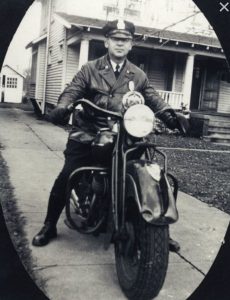
VA Director Forever Grateful
The VA director, Arthur L. Criswell, said that he would be forever grateful to the two police officers who had taken bullets for him. He reflected, “I was in World War I, serving as a doughboy, and in the last war, I saw considerable combat duty, but I must say I never saw anything like what happened in my private office this afternoon.”
An Erie Daily Times article reflected two days after the shooting, “Several police officers noted that it would have been relatively simple for someone to have shot Hartwell through the door while he was covering Criswell. But they said that the entire force, from the highest echelons down, despite the shootings, that the police principle, ‘let the other guy shoot first,’ should be followed.
As Waldinger and May lay critical in their hospital beds, Hartwell came before Alderman George J. Brabender. With Hartwell accused of shooting with intent to kill, his attorney, William E. Pfadt, intended to have him declared incompetent to stand trial. Ironically, Pfadt was a first cousin to Leo Waldinger’s wife, Geraldine.
Hartwell seemed relatively unconcerned, but he did admit the shooting was not justified. He insisted, though, that he just wanted to finish telling his story and he shouldn’t have been interrupted.
By Monday, November 21st, the officers were reportedly gaining slightly. The Erie Daily Times ran the following statement in support of Erie law enforcement:
Two courageous Erie policemen, Leo Waldinger and Walter May, are fighting for their lives as this is written and it is the prayer of a shocked community that they will win the battle.
Their bravery in attempting to capture and subdue a mentally ill veteran suddenly gone berserk with a loaded revolver was a demonstration of fearlessness seldom surpassed here.
To do what these two officers did—walk in on a maddened man waving a .38 and attempt to nab him before he can use it—was police valor of the first order.
Ever since this tragic affair we’ve been thinking how often both the public and press are so quick to criticize police for occasional indiscretions. Too often it is hair-trigger judgment and picayune in the face of the fine things a capable police department represents.
It is our hope and the hope of the community that Officers May and Waldinger will pull through and, God willing, one day return to duty to receive recompense and recognition for their valiant work as police officers.
In connection with all of this, we are among those wondering how this veteran was at large after detention in mental hospitals on four different occasions. It would seem that after that much observation of his violent nature permanent incarceration should have been followed.
Hundreds of Erieites donated blood for the two officers. People all over Erie and beyond were praying and sending well wishes. J. Edgar Hoover, director of the FBI, called and requested daily updates on Waldinger’s condition. He told the Erie Daily Times, “The shooting of Sgt. Waldinger was truly tragic. We regarded him as an outstanding graduate of the FBI Academy and we were watching his career in Erie with more than ordinary interest. Please convey my concern and sympathy to his family and his friends and the knowledge that Sgt. Waldinger’s friends here are praying for a speedy recovery.”
At first, neither man was expected to survive. Then, the men rallied, and Waldinger even seemed to have gained some color in his face. One week after the shooting, though, after a restless night for both men, they started growing weaker. Waldinger still had a bullet lodged in a muscle on his lower left side. Two bullets remained in Walter May’s body.
Meanwhile, Attorney Pfadt said that Hartwell, being held in Erie County Prison, would likely never stand trial, although he wanted to, so he could expose his grievances with the VA. Instead, two psychiatrists would examine him and if he was found to be insane, he would be committed to an asylum without further court action.
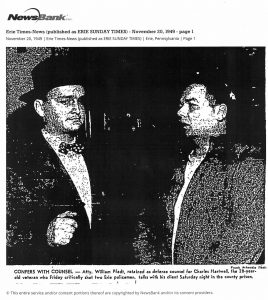
Waldinger Loses the Fight
On Friday, November 25th, as Waldinger grew weaker, he was given transfusions of blood, plasma, and glucose. Three private nurses continued their round-the-clock care and Dr. Mainzer came in several times that day. His family was called to his side. His wife, Geraldine, lay in a hospital room herself, having been there for most of the week. His children hadn’t seen him since he left their home a week before.
At midnight, a priest was called to give Waldinger last rites for a second time; the first having been on the floor of the VA office. Although the officer wasn’t able to carry on a conversation, he was able to answer yes and no questions from his family members. Eventually, his breathing became more labored, but he did not seem restless.
Then, at 2:28 a.m. Leo Jonas Waldinger took his last breath. His death certificate stated that peritonitis had set in after the gunshot wounded the transverse colon. Peritonitis is an inflammation of the silk-like membrane lining the inner abdominal wall, usually caused by a bacterial or fungal infection.
The Erie Daily Times called Waldinger a martyr and set up a fund for Leo’s wife and children, seeding it with $100. Geraldine would also receive a pension from the FOP and some officers were petitioning to have the amount increased.
FBI Director Herbert Hoover wired his condolences directly to Geraldine. “His heroic action in line of duty will forever remain an example of self-sacrifice and devotion to the cause of law enforcement, which he loved and served so magnificently.
The police chief and other city officials expressed their grief. “Everyone always had a good word for Sgt. Waldinger,” said Chief William J. Donohue. “He was a great policeman and respected by all the men on the force.” On Sunday morning, all police offices wore a thin black band across their badges.
“He believed until the last he was going to live,” his nurse, Miss Burger said. “The fight he waged was one of the most courageous I have ever seen.”
When Hartwell was informed of Waldinger’s death, he said nothing, but looked “alarmed and frightened.” Now, Hartwell was formally arraigned in front of Alderman Brabender.
Leo Waldinger’s viewing took place at the Francis V. Kloecker funeral home with members of Sacred Heart Parish gathering for special rites and the Knights of Columbus conducting a service there.
On the morning of Tuesday, November 29, 1949, city and state police flanked as an honor guard carried Leo’s coffin from the funeral home to the hearse where city officials stood. At an overflowing Sacred Heart Church, Geraldine and the children followed the casket as it was brought to the altar by pall bearers, including Mayor Joseph C. Martin. After Mass, Geraldine and the children led the procession out of the church, with the widow being assisted by Leo’s brother, Joe. An honor guard made up of both the city and state police was at the funeral. All the policemen wore dress coats and black gloves. Leo Waldinger was then taken by escort to Calvary Cemetery for interment.

Patrolman May Loses His Battle, Hartwell Sent Away
The day after Waldinger’s funeral, Patrolman Walter Rynold May, 45-years-old, the married father of six, lost his battle, too. Doctors had performed a second surgery the day before to remove one of the bullets because he had developed an infection. His cause of death, like Leo’s was peritonitis caused by a gunshot wound—homicide.
After May died, Hartwell had two murder charges facing him, but ultimately he was found to be insane. Dr. John J. O’Donnell, one of the psychiatrists who examined Hartwell, said that he had been deranged for a very long time and that he would likely be committed for life.
The Erie Daily Times reported on bizarre remarks Hartwell made as he was waiting in the outer office of the county jail to be taken to Farview State Hospital for the Criminally Insane near Scranton, PA. According to the article, he said, “I hope there are more shootings like this—that’s all I hope. What’s the difference between the policemen dying and me dying? It’s the survival of the fittest—the law of society.”
Earlier that day, Hartwell told his attorney that if he ever got out of Farview, he would sue the government for $100,000 for the mistreatment he received in the Army and his incarceration. The last thing he said before he left town was, “It isn’t legal at all.”
In 1951, William E. Pfadt, Hartwell’s attorney, and the cousin of Waldinger’s widow, applied for World War II compensation on behalf of his client. This is the form mentioned earlier that shows the typewritten June date of enlistment being stricken in pencil and the December date written in. The request was approved for payment on May 2, 1951. Of note are the addresses of Hartwell’s parents on the form. His father’s is listed as Warren State Hospital.
Just weeks after Hartwell’s benefit request was approved, the Erie Police Department placed framed photographs of four fallen officers on a wall in the captain’s office. Each photograph had a gold-plated plaque under it telling the story of the officer. The first two were Detective Sgt. James Higgins and Detective Sgt. John T. Grant, slain in 1905 and 1912, respectively. The last two were for Waldinger and May.
Hartwell was 28 years old when he murdered Waldinger and May. When he was 56 in December of 1977, having spent half of his life incarcerated, doctors at Warren State Hospital, where he had been transferred, declared that he was now fit to stand trial and was released. Police immediately arrested him, and upon request of the district attorney, he was evaluated again. This took some time, and in December of 1978, he was returned to Warren State Hospital having been found to be mentally incompetent.
In November of 1985, Hartwell surfaced when a hearing was held at Warren State Hospital to change the frequency of his competency hearings from every six months to annually. The Erie prosecutor advised the Warren hearing officer that murder charges were still pending against Hartwell should he ever be found competent. The Warren doctor said that Hartwell was incompetent to stand trial. Hartwell died on December 16, 1986.
Neither Leo Waldinger’s nor Walter May’s widows remarried. After Walter’s death, his wife, Sara, worked as a cook at East Erie Turners from 1950 until she retired in 1975. She passed away on July 27, 1986. Geraldine Waldinger found work as a secretary at St. Vincent Hospital, First National Bank, and Northwest Tri-County Intermediate Unit. She died on October 10, 2003. Both women were survived by all of their combined nine children, six for Mrs. May and three for Mrs. Waldinger.
Today a monument stands to honor Erie County fallen officers on the west side of Perry Square in downtown Erie. Each year a ceremony is held there during National Police Week.
Update: I attended the officer memorial ceremony on May 12, 2021. I am grateful to all the police officers who were reminded that day that life is precious and that they put their lives on the line every day.
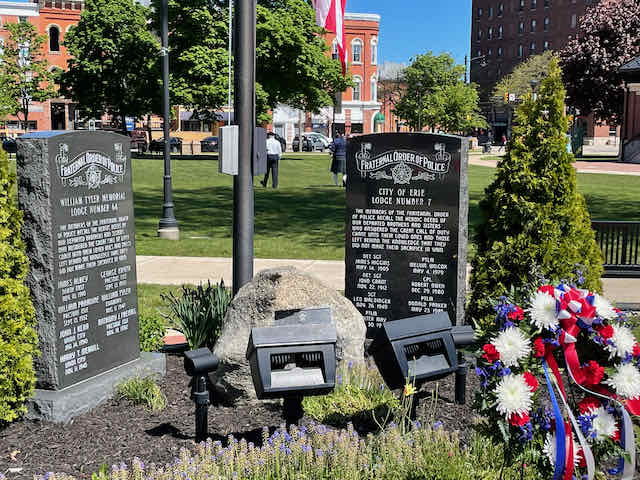
Note From the Author:
Leo J. Waldinger was my great uncle. My mother was only fifteen years old when he died, but he had already made a positive impact on her life. When she was twelve years old, she and a friend decided to run away to Washington, DC. They boarded a bus but were soon returned home. It was Uncle Leo who visited afterward to gently counsel her. She never forgot his kindness.
The first time I ever heard the word “berserk,” I was quite young. That was the word used by my family members to describe Charles Hartwell when they recalled that day on November 18, 1949. That is also how the press described him at the time. The modern-day term for his illness is schizophrenia, which often appears out of nowhere in early adulthood. This could have been the case with Hartwell, an unfortunate correlation with his entering military service, or perhaps there was something more.
I don’t remember anger or hatred expressed by my family members toward Charles Hartwell. I do recall compassion, sadness—and great love and admiration for Uncle Leo, whom we regard as a hero. I wish I had known him.




A true hero–thanks for sharing. Such a sad story.
Ann, this is an excellent story. Mom had told me of the story of the shooting but you obviously put so much work into getting all the details. It is a story that I will keep and ha d down to each generation in our family. Uncle Leo and your story should be remembered!
Ann, this is such a heartfelt, heroic and well-written family story. Thank you for having shared it.
This is a tragic story in two ways. Foremost, it is a tragedy for your family, for all of your Uncle’s family and friends — and for you, personally, since the shooting took away any chance that you might have gotten to know him. But on a larger scale, this tale illustrates the tragedy we’re experiencing nationwide with law enforcement. Officers Waldinger and May were true public servants, making a field decision with compassion and mindfulness that the perpetrator was human and deserved some consideration other than “shoot first and asking questions later”. That humane ethos seems to be withered away among today’s law enforcement, putting the public’s lives in the crosshairs in an effort for police to immediately control and dominate a situation. That’s a tragedy for all of us.
Interesting how the the perspective hasn’t changed in all this time: “ Ever since this tragic affair we’ve been thinking how often both the public and press are so quick to criticize police for occasional indiscretions. Too often it is hair-trigger judgment and picayune in the face of the fine things a capable police department represents. ”
A heartbreaking story. Thank you for bringing them back to life for a little while.
This was a very interesting article. It’s very distressing in today’s society that many do not respect what our men in blue do for us each and every day.
It’s hard to comprehend that now we are actually imprisoning officers for making that split decision to use their weapon when it does not adhere to society’s new way of thinking. Policemen are now dying because they sometimes now hesitate before acting because they know bad consequences may follow. The bad guy does no such thing.
Thank you for such an interesting and well written article.
Thank God for heroes like these two officers.